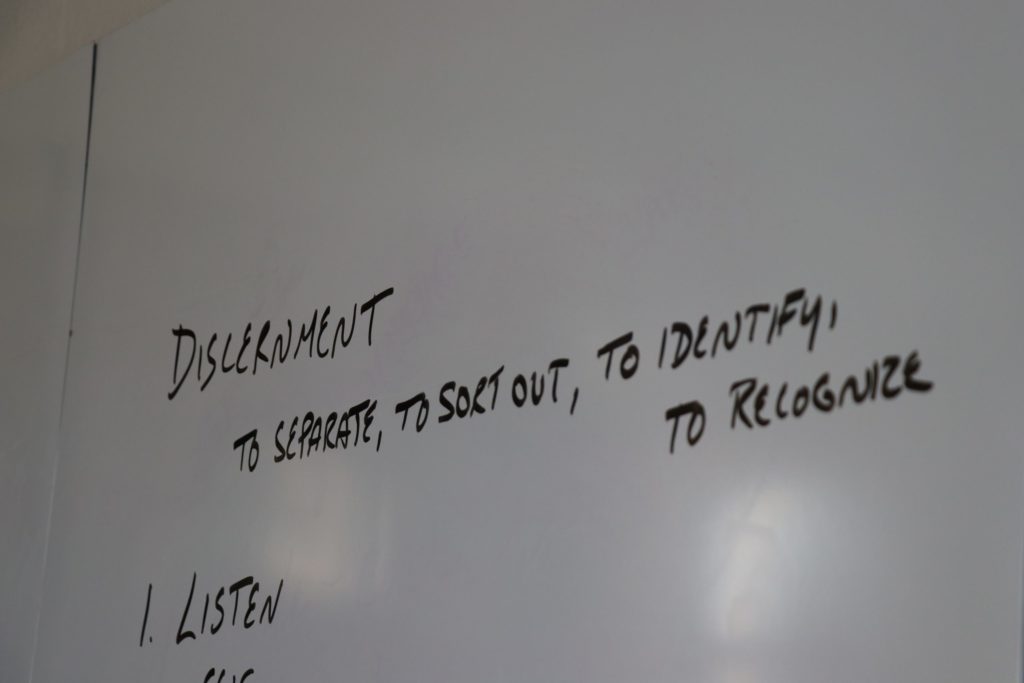Bulletin Insert: Lent 2 (B) – Meet Our Religious Communities: Discernment of Vocation – February 28, 2021
If I feel that God is calling me to go deeper in my spiritual life, what paths might I consider?
In baptism, we are sealed as Christ’s own forever, and all are fully welcomed into the Christian family. And, some may feel called to make a fuller commitment of their time and their lives to God. This may be a call to lay ministry, to ordained ministry, or to religious life. It may be a call to a combination of these.
How does someone discern a vocation to religious life?
A vocation to religious life can take a number of different forms. There are Christian communities whose members live independently, hold jobs, engage in ministry, may have a partner or spouse, and who also take vows and connect with each other as devoted and loving community.
Members of monastic communities are single, live together, and take vows of poverty, celibate chastity, and obedience. Benedictines may also take a vow of stability. Some monastic communities are primarily contemplative, others primarily active, and still others balance a “mixed life” of both prayer and active ministry.
What is the difference between a call to ordination and to religious life?
Clergy are leaders in the church, in worship, and in the pastoral care of congregations. Religious (what we call members of religious communities) may be involved in parish ministry, or other types of ministry, or may be primarily engaged in contemplative prayer. Religious almost always contribute in some ways to the maintenance and well-being of their community life.

Religious have an extended opportunity to nurture their own spiritual growth and to center their lives on God. The experience of living together (or in close association) with others on a similar spiritual journey enhances our ability to grow into blessed community and to share these blessings with others in the church. For those called to this life, it can be a source of great joy and fulfillment.
Some people may have a dual vocation, both to religious life and to ordination. These are separate callings, that may occur in the same person. Usually the discernment of and formation in these vocations should be engaged separately.
What is the process of becoming a religious sister or brother?
Communication and visits with several communities would be a good place to start, as well as ongoing conversation with a spiritual director.
For more information, visit www.caroa.net and www.naecc.net.
28 de febrero de 2021 – Cuaresma 2 (B)
Conozca nuestras comunidades religiosas: el discernimiento de la vocación
Si siento que Dios me está llamando a profundizar en mi vida espiritual, ¿qué caminos podría considerar?
En el bautismo, somos sellados como propiedad de Cristo para siempre, y todos somos bienvenidos en la familia cristiana. Y, algunos pueden sentirse llamados a hacer un compromiso más pleno de su tiempo y su vida con Dios. Este puede ser un llamado al ministerio laico, al ministerio ordenado o a la vida religiosa. Puede ser un llamado a una combinación de estos.
¿Cómo discierne alguien una vocación a la vida religiosa?
La vocación a la vida religiosa puede revestir diversas formas. Hay comunidades cristianas cuyos miembros viven de forma independiente, tienen trabajos, participan en el ministerio, pueden tener una pareja o cónyuge, y que también hacen votos y se conectan entre sí como una comunidad devota y amorosa.
Los miembros de las comunidades monásticas son solteros, viven juntos y hacen votos de pobreza, castidad célibe y obediencia. Los benedictinos también pueden hacer voto de estabilidad. Algunas comunidades monásticas son principalmente contemplativas, otras principalmente activas, y aún otras equilibran una “vida mixta” de oración y ministerio activo.
¿Cuál es la diferencia entre un llamado a la ordenación y a la vida religiosa?
Los clérigos son líderes en la Iglesia, en el culto y en el cuidado pastoral de las congregaciones. Los religiosos (lo que llamamos miembros de comunidades religiosas) pueden estar involucrados en el ministerio parroquial u otros tipos de ministerio, o pueden estar principalmente comprometidos en la oración contemplativa. Los religiosos casi siempre contribuyen de alguna manera al mantenimiento y bienestar de su vida comunitaria.
Los religiosos tienen una amplia oportunidad para nutrir su propio crecimiento espiritual y centrar sus vidas en Dios. La experiencia de vivir juntos (o en asociación cercana) con otros, en un viaje espiritual similar, mejora nuestra capacidad de crecer en una comunidad bendecida y compartir estas bendiciones con otros en la Iglesia. Para los llamados a esta vida, puede ser una fuente de gran alegría y satisfacción.
Algunas personas pueden tener una vocación dual, tanto a la vida religiosa como a la ordenación. Estos son llamamientos separados, que pueden ocurrir en la misma persona. Por lo general, el discernimiento y la formación en estas vocaciones deben realizarse por separado.
¿Cuál es el proceso para convertirse en hermano o hermana religiosa?
La comunicación y las visitas a varias comunidades serían un buen lugar para comenzar, así como la conversación continua con un director espiritual.
Para obtener más información, visite www.caroa.net y www.naecc.net.
Don’t forget to subscribe to the Sermons That Work podcast to hear this sermon and more on your favorite podcasting app! Recordings are released the Thursday before each liturgical date.
Receive Free Weekly Sermons That Work Resources!


